"Raymond Years Ago"
By George W. Harper
Journalist - Editor - Owner Of Hinds County Gazette 1845-1883
A Series Published in the Hinds County Gazette, 1878-1879
From the Gillespie Collections edited by Pattie Adams Snowball and Rebecca Blackwell Drake
Home Page
Harper Arrives in Mississippi
Vicksburg & Meridian RR
Businesses in 1844
The Raymond Bar
Early Merchants
1844 Businesses
Seat of Justice
Cotton Industry
Early Churches
Establishment of Schools
John B. Peyton
Raymond Area Homes
Medicinal Resorts & Spas
The Mexican War
Early Churches
Early Schools
Raymond Female Institute
Raymond Military Institute
McNutt-Foote Debate
1844 Presidential Election
Local Elections of 1845
Literary Raymond
Raymond Fires
Old Log Jail
Death of Jos. Stewart
Murder of Benj. Sims
Duel Ends in Death
Raymond & Bolton RR
Harper Elected Mayor
Chaos at Oak Tree Hotel
Great Fire of 1858
Early Area Settlements
-
Amsterdam
-
Yeizer's Store
-
Newtown
-
Meridian Springs
-
Sturgiss Store
-
Dry Grove
-
County Line
Rev. Fisk's Biology Class
Fisk Charged with Fraud
Fleetwood Tragedy
Local Racetracks
Dignitaries Visit Raymond
Winning the Lottery
Fire Company No. 1
"Devoted & Valued Friend"
Tribute to Amos Johnson
Yellow Fever Strikes Raymond
Doctors Treating Victims
Cooper's Well
Mississippi Springs
Newspaper Entrepreneurs
Yankees Sack Gazette Office
Fate of Editorial Giants
Henry Clay Defeated in 1844
Stray Cats in Raymond
"A Remarkable Occurrence"
Blow That Punky Bell to Hell"
Isom Bldgs Destroyed
1851 Gubernatorial Election
Union Ticket Sweeps State
New Raymond Courthouse
Gibbs Building Rebuilt
Hinds Co. Poor House
Schools Struggle
Murder of Addie Owens
War comes to Raymond
The Battle of Raymond
Willie Foote Captured
Make-shift Hospitals
Yankees Occupy Raymond
Raymond Lodge No. 21
Odd-Fellows' Graveyard
Bolls Incarceration
Crimes Blamed on Whisky
Peyton's Willow Tree Prank
Politics in Raymond
Presidential Election 1860
Hinds Co. for Succession
Raymond Fencibles Organized
Churches Reorganize
The Clinton Riot of 1875
Why the Great Uneasiness?
Deaths of Sivley & Thomson
"Kill the Raymond Men"
Harrison Election
Political Gatherings
Event at Dupree's Grove
Presidential Election 1876
Governor Ames Impeached
Great Wrongs Investigated
Fight the Devil with Fire
Reconstruction Era
Harper Ends with Poetic Vision
Part I
George Harper Arrives in Mississippi, 1844
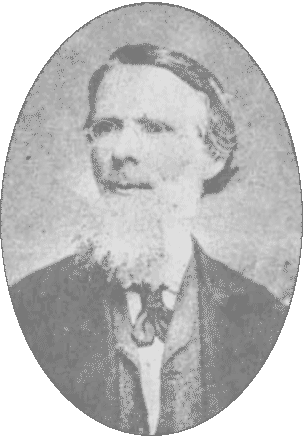 The rugged and precipitous mountains of Western Virginia
were covered with a beautiful mantle of snow on the morning of the 15th of
October, 1844, and the air was pure and frosty. The sun rose clear, bright and
beautiful and as its first rays kissed the mountain’s side, the sparkling was
not unlike that which would have been reflected by the most precious diamonds.
The rugged and precipitous mountains of Western Virginia
were covered with a beautiful mantle of snow on the morning of the 15th of
October, 1844, and the air was pure and frosty. The sun rose clear, bright and
beautiful and as its first rays kissed the mountain’s side, the sparkling was
not unlike that which would have been reflected by the most precious diamonds.
A full-grown boy, inexperienced and without means - indeed, like Noah Webster’s first Dictionary, without the backing of money, credit or friends - was about to leave the haunts of his youth to find a home among strangers in a distant state. He had neither purse nor scrip, nor had he credentials or letters recommendatory.
The Vicksburg & Meridian Railroad
There were then no railroads in all the now mighty West - no railroads then in all that vast region which is now like one beautiful garden, and fairly a network of railroads. Hence, a steamer was the conveyance for the boy traveler, and after something over two weeks of running in the Champion, one of the best boats of the period, he was landed at Vicksburg, at 10 o’clock at night, on the second day of November, which was the first day of the presidential election of that year, at which Mr. Clay and Mr. Polk were the opposing candidates. Each party was having a rousing meeting, and a torch-light procession in the city, amid beating of drums, waving of banners, and firing of cannon. Sergeant S. Prentiss was the orator for the Whigs, and Robt. J. Walker for the Democrats. Both were northern born and raised men yet each was the idol of his party.
 The
boy traveler remained aboard the boat until daylight and then found his way to
the railroad depot (for the V. & M. R. R. was then completed to Jackson) and
bought a ticket for Edwards, which was then the R. R. station for Raymond, and
which was just then swallowing up the grand emporium known in history as
Amsterdam. Our traveler reached Raymond at nightfall and it was a calm, charming
evening with a moon as soft and lovely as that which mantles in grandeur Italy’s
beautiful scenery. The boy traveler had reached the locality for which he had
embarked. He had arrived at Raymond.
The
boy traveler remained aboard the boat until daylight and then found his way to
the railroad depot (for the V. & M. R. R. was then completed to Jackson) and
bought a ticket for Edwards, which was then the R. R. station for Raymond, and
which was just then swallowing up the grand emporium known in history as
Amsterdam. Our traveler reached Raymond at nightfall and it was a calm, charming
evening with a moon as soft and lovely as that which mantles in grandeur Italy’s
beautiful scenery. The boy traveler had reached the locality for which he had
embarked. He had arrived at Raymond.
Old Courthouse, Stone Jail and Businesses
The old brick court-house stood on what is known as the public square. It was a strangely constructed building with a spire running heavenward, covered with bright tin, which sparkled as it caught the rays of the sun, and fairly dimmed the eye that rested upon it. A “Whig Pole,” from which floated in grandeur the American flag, inscribed with the name of Harry [sic] Clay, was in front of the edifice and many noble heads often turned in admiration to it. The pole firmly remained in place, and the flag continued proudly to flutter in the breeze, until sometime in December, when they were removed by those who had placed them in position.
The old stone jail was then the jail of the whole county of Hinds, and it was in charge of Lemuel Edmonson, Deputy Sheriff, who was one of the characters of the town and who died many years ago. Daniel Thomas, (the honored father of our present Sheriff,) was the Sheriff of the county; Henry G. Johnston, of Clinton, was Probate Judge; R. N. Downing was Circuit Clerk; Henry Smith was Probate Clerk; Joshua Mullins, was Ranger; D. P. Harrison was postmaster; and W. G. Jennings was Mayor of the town. All these parties are now dead, but many of them have relatives among us.
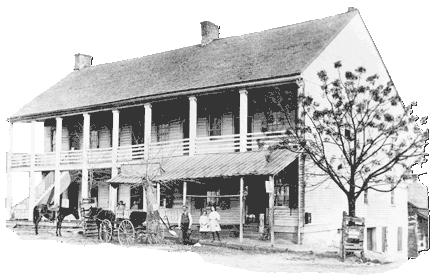
Oak Tree Hotel
The Oak Tree was then the fashionable hotel of the town, and was kept by Mrs. Thomas Robinson, the mother of the late Col. T. A. Mellon. Mrs. D. J. Johnston kept what is now known as the City Hotel, but it was rather a boarding house than a hotel.
There was then but one church in Raymond, the Methodist, and the Rev. P. Cooper, of Cooper’s Well fame, was the pastor.
The physicians of the town were four in number: N. W. Vallandigham, A Patton, J. R. Dougherty and D. M Dancy, all of whom are still living save Dr. Vallandigham but long ago removed to other points.
The Raymond Bar
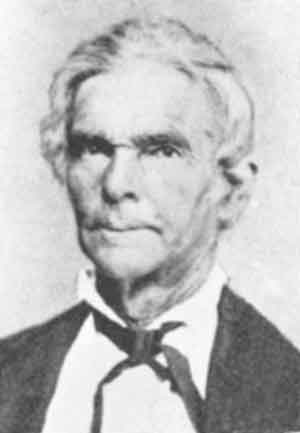 Philip Augustine Lee (A. L.) Dabney |
The Bar of Raymond was then much stronger in number than now. We had Judge Trimble, W. E. Rives, S. C. Barton, A. L. Dabney, A. R. Johnston, T. J. Wharton, J. J. Davenport, D. C. Briggs, Thos. Robinson, and J. N. Mitchell who were regarded as older members: with F. A. R. Wharton, E. W. F. Sloan, John Shelton, R. H. Brigg, S.A.D. Graves, J. H. Stewart, and others who were styled “the young members.” Of the sixteen, T. J. Wharton, A. R. Johnston, J. J. Deavenport, F. A. R. Wharton, John Shelton and S. A. D. Graves (six) are the only ones who survive; while John Shelton and F. A. R. Wharton, who were young men in 1844 are the only ones who are not citizens of the town; both, we are happy to say, enjoy the unlimited confidence of the community in which they have lived so long and served so faithfully and successfully.
The South-Western Farmer was then the only paper in Raymond with King & North as publishers, and North and Phillips as editors. Dr. Phillips now resides at Oxford - the others are dead.
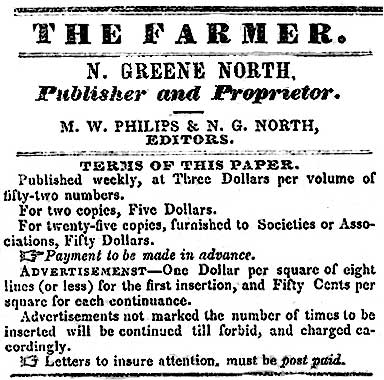
Early Merchants
The merchants of the town were O. V. Shearer, G. W. Gibbs, Danl. Black, G. W. Osborn, Daugherty & Seaton, E. H. Watson, Thomas Mount, D. M. Johnson, and A. Casper.
Messrs. Gibbs, Black and Casper still survive and are yet
citizens of the county.
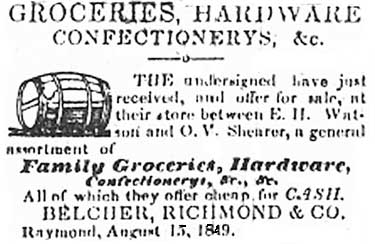 Raymond was then supplied with a mail from Edwards - a hack
running between the two points as now between Raymond and Bolton. There was no
town nor post office then at Bolton, and Edwards had but a single store and
dwelling house.
Raymond was then supplied with a mail from Edwards - a hack
running between the two points as now between Raymond and Bolton. There was no
town nor post office then at Bolton, and Edwards had but a single store and
dwelling house.
On the road from Bolton to Raymond, there was then not a house until Col. Isom’s was reached, two miles from Raymond, (now known as the Waddill or Harper place.). Then came the county poor-house, which was located near where V. J. Waddill now lives, one mile from Raymond. The house now occupied by Mrs. Downing, was then vacant and so, also, we believe, were the now beautiful premises of John Shelton; but a house stood on the opposite side of the road from Mr. Shelton’s, which was occupied by Daniel Thomas; while near where C. C. Heard’s residence now stands stood a house which was then occupied by A. J. Chapman.
Raymond then had a much larger white population than now. There were then, or a year or two afterwards, 188 voters polled during town election. There are not now half that number of white votes within the corporation limits.
The money in circulation in this part of Mississippi was then almost exclusively gold and silver - the gold being English sovereigns and the silver, French five franc pieces. The cotton buyers at New Orleans paid out this money, and it was sent directly inland to the producer, the rule then being not to consume the crop in supplies before it was made.
Good cotton then sold in Raymond at 4 and 5 cents; corn at 40 cents; potatoes at 37 ½ cents; wood at $2.50 a cord; and newspapers at $3 a year. And the people were all making money and recovering rapidly from the financial disasters of ’39, ’40 and ’41.
All photographs and illustrations were edited into the series by Pattie Snowball and Rebecca Drake.
Copyright © 2008 PattieAdams Snowball, James and Rebecca Drake